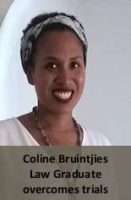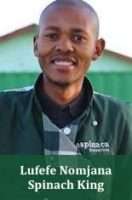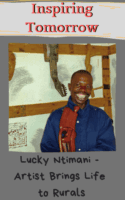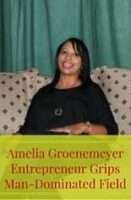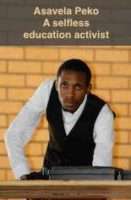It’s that time of the year when students have learned their fate. Are they progressing to tertiary education? To second year or third year? Will they make it through this challenging next level of learning? One person who’s a living example that varsity challenges can be overcome is Coline Bruintjies.
Coline is now twenty-six and she’s from Lansdowne in Cape Town. She graduated with a Bachelor of Laws degree (LLB) from the University of Cape Town (UCT) in 2012, but she’s the first to admit that it was tough getting that degree.
All young Coline wanted was to fulfil her dream of representing innocent people in court, but she found herself struggling to get past her own trials.
“From my first year there were times when I thought, ‘I can’t do this, I don’t want to do this anymore’. At school I was on the merit list; . But then when I got to varsity I felt like I was less than nothing. I lived in the library. I’d go for months without seeing my friends and I’d read for three to four hours a day, excluding lecture times,” she recalls.
“I was studying throughout December while everyone else was on the beach and enjoying holidays. I was studying because it needed to be done. You could see in my face that most days I was so unhappy,” she continues.
“It was really hard and emotionally draining. There were times I felt like I was sinking into the ground. I felt so small and insignificant. I failed my first subject in my second year. It broke me and I couldn’t understand why I was struggling. I’d be sitting in my room, alone in the corner. I can’t even tell you how many times I cried myself to sleep.”
This was all a big adjustment, a reality check about what is expected in tertiary study, because Coline had never struggled academically before.
“I always worked really hard from a young age and was very ambitious. High school was more difficult than primary. In primary I felt okay to be a nerd but in high school it wasn’t cool to do your homework or not swear, so I didn’t really fit in. But I didn’t care what people thought. In my mind, I just needed to work hard so I could get a bursary to go to varsity,” she says. (She did get that bursary, from a law firm.)
So being at UCT didn’t only teach her law, she learnt much about herself as well.
“It was one of the most humbling experiences of my life, because I learnt that I was not this perfect individual who can do everything. I have weaknesses and I’m a part of something greater than myself. There’s so much more than this.”
Coline’s upbringing and experiences studying law gave her a strong interest in social justice, and as you’d expect from a law graduate, she hasn’t turned a blind eye to current social injustices.
“I grew up being very aware of the inequalities that exist in society and that we come from a history where people were excluded,marginalised and discriminated against, simply by virtue of the colour of their skin, and that certain people had privileges because of their skin colour,” she explains.
“I’ve looked around and seen that, despite living in a democracy and having so many more opportunities than our parents had, there’s still inequality in our society. All people are equal because we’re all human beings regardless of race, nationality or religion. We’re all are humans who have inherent human dignity and that’s something I’ve been aware of for a very long time.”
And so, while Coline recognises the progress that South Africa has made, she feels a lot still needs to be done, and she wants to be part of the solution.
“The fact that we still have so many informal settlements. The fact that people still struggle to get basic things such as access to education and healthcare. I’ve seen that even though our country has come a long way we still have a long way to go, so the struggle continues,” she says.
Coline maintains that using law can be a big part of the remedy.
“If law is used effectively it can become a tool to create the kind of society we envision, where we’re equal and respect other people. I saw it as something that could … empower me and give a voice to those who’ve been voiceless. Also, many people have been told that what they think doesn’t matter, but with a law degree I realised I could help other people have their voices heard.”
In 2014 Coline decided to make a journey. She left South Africa hoping that she’d learn more about Africa – but also discovered more about herself.
“I always wanted to visit another African country so I visited Uganda for seven weeks. I’m always eager to learn about different people and cultures. I found that being in a community that’s different from what I’m used to helped me become more open-minded and tolerant.”
The trip also clarified for her the direction she wanted to take in her work. “When I came back I knew I didn’t want to go work for a law firm. I wanted to do human rights work. I’m committed to getting access to justice for all people, not only for those who can afford to pay for it. The majority of people in our country don’t have access to private lawyers, and so that work didn’t appeal to me.”
Many people want to get into law because of how much it pays but to Coline that’s not the case.
“I thought everyone who did law was interested in social justice but I was wrong. Some people said they were in it so that they can earn lots of money. I always thought law and justice were the same, but law school taught me otherwise. I realised that the law doesn’t work for everybody.”
As a result, she took up employment with a national non-profit organisation based in Muizenberg, Cape Town.
“I’m currently the National Project Coordinator for the Constitutional Literacy and Service Initiative (CLASI). I coordinate all our programs nationally. We are focused on human rights and constitution-based education in under-resourced high schools and communities.”
To do this work, CLASI recruits and trains law students to go out into schools as part of their community service, to help young people know their rights, to see how this affects their lived realities and how they can use this to exercise agency in their own lives.
“I first got introduced to CLASI back in varsity. I volunteered to teach at a school in Khayelitsha, as a part of CLASI’s schools programme, for a year and that was one of the best experiences ever. It was so encouraging and eye-opening. We currently work with law students from seven universities.
“We conduct training and develop content for the lessons. We organise community workshop as well. CLASI is also involved in the National Schools Moot Court Competition and in advocating for access to effective Constitution-based education for all people in South Africa”
Coline believes that the Constitution should be part of everyone’s life: “Our main objective is to let people see the Constitution as their document. The Constitution doesn’t exist for law students, or magistrates; it belongs to all people.”
However, Coline says that no-one can ignore the fact that certain rights in our Constitution are
hard to achieve for everyone, and are violated.
“One student once asked, ‘What does the right to education mean to me if I don’t receive the same quality of education as someone who goes to a private school? We don’t get our textbooks on time and our teachers don’t pitch up to class sometimes, and you want to tell me about the right to education!’” she recalls.
Coline adds that she couldn’t say otherwise to that student, because that’s their lived experience. However, she says that we as citizens need to be proactive about turning around situations like this.
“Living in a democracy doesn’t just mean going to vote every five years. It means you remain an active citizen by holding the government accountable. You say, ‘We’ve elected you to lead us and now we need to ensure you do what the Constitution says’.”
When the conversation turns to education, while Coline condemns the violence and destruction of property that accompanied some of the recent student protests, she also feels that it is great that these students have had the courage to fight for their rights and speak truth to power.
“We shouldn’t have to use violence in order to be heard. You’re hindering your own right to education by burning the resources you should be using to study. Education is one thing that noone can never take away from you,” she says.
Another topic that Coline couldn’t shy away from is the racism and consequent debate that’s currently making headlines.
“How long is it going to take to get to a point where we can walk down the street and see human beings, not their skin colour? We do need to acknowledge our differences but at the same time we need to have respect and tolerance for people that we may view as ‘the other’. I don’t want to change the world but at least to trigger something in somebody. Hope, love, freedom, peace and justice are all possible,” she concludes.
What advice does she have for students studying now, or just setting out on first year? As someone who knows how it feels to repeat a subject at varsity, she says:
“Any kind of situation we may find ourselves in will pass. No setback or obstacle is permanent. It may take a day, or ten years, but the change will come eventually. We don’t have to accept a situation – we should push ourselves out of it. Get guidance and support. You’d be shocked to learn how many people have gone through worse things. No-one will know what my struggle is if I don’t cry out for help. There are people with similar stories out there. Many of our struggles are common struggles.”
She says her faith also carried her through her degree: “When the results came out I cried in disbelief. I looked at the results and I knew it was God’s grace. There’s no way I could have done that on my own. I knew there was something bigger and greater at work. I can’t take credit for my law degree. I respect other people’s beliefs, but I personally believe that God carried me through,” she says, failing to hold her tears back.
Coline also had the backing of her family. She says, “I don’t know what I would have done without the support of my parents. They kept encouraging me. They could see I was at a breaking point but they told me to keep pushing.”
Coline’s determination to overcome difficulties, get her degree and find fulfilling work reminds
one of the inspiring and sensible words of our previous interviewee, Siya Mlungu, who said,
“People do not fail, it’s the approach they use that fails.”
Find CLASI at http://www.clasi.org.za/ or follow their Facebook page: www.facebook.com/ConstitutionalLiteracyAndServiceInitiativeClasi.
***


